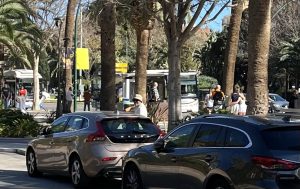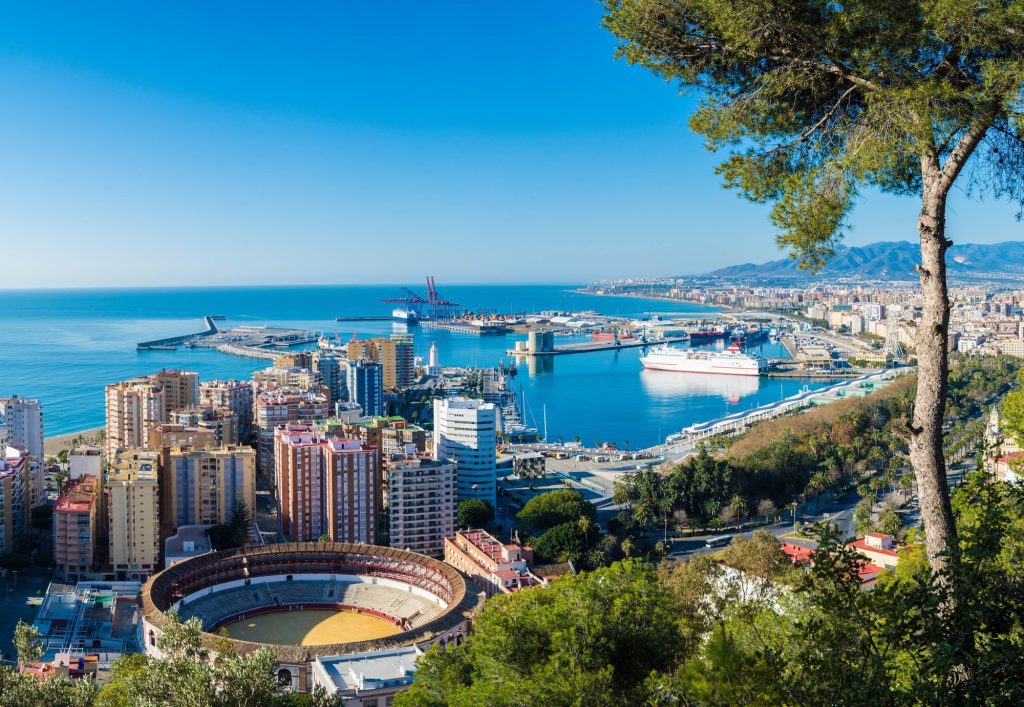
The kindness of strangers
On Tuesday we made our way to Malaga on an early bus. It was the first day of full sunshine after several of rain and grey skies. There was a spring in our step.
Malaga’s a vibrant place of fine architecture and lush, shaded gardens. It’s one of the oldest continuously inhabited cities in Western Europe, founded in 770 BC by Phoenicians from the Levant (what we know now as Lebanon).
The Greeks came next and later the Romans, who colonised Spain and hung around for over 600 years. Then there were the Visigoths and later still, the Moors. Their arrival was followed by a centuries-long conflict with the Christian kingdoms of Europe.
With such a rich and varied history Malaga offers much to see and do and we set off along the harbour, the sun glistening on the sea as we made our way to our first stop, the Pompidou Centre.
We passed under the impressive Paseo Marítimo Antonio Banderas, pictured below, the pale pattern of shadows cast by its fins changing slowly throughout the day as earth ambles around the sun at 67,000 miles per hour.
Then we walked through the Parque de Malaga, a beautiful area shaded by a an abundance of lovely trees and plants (2nd pic).
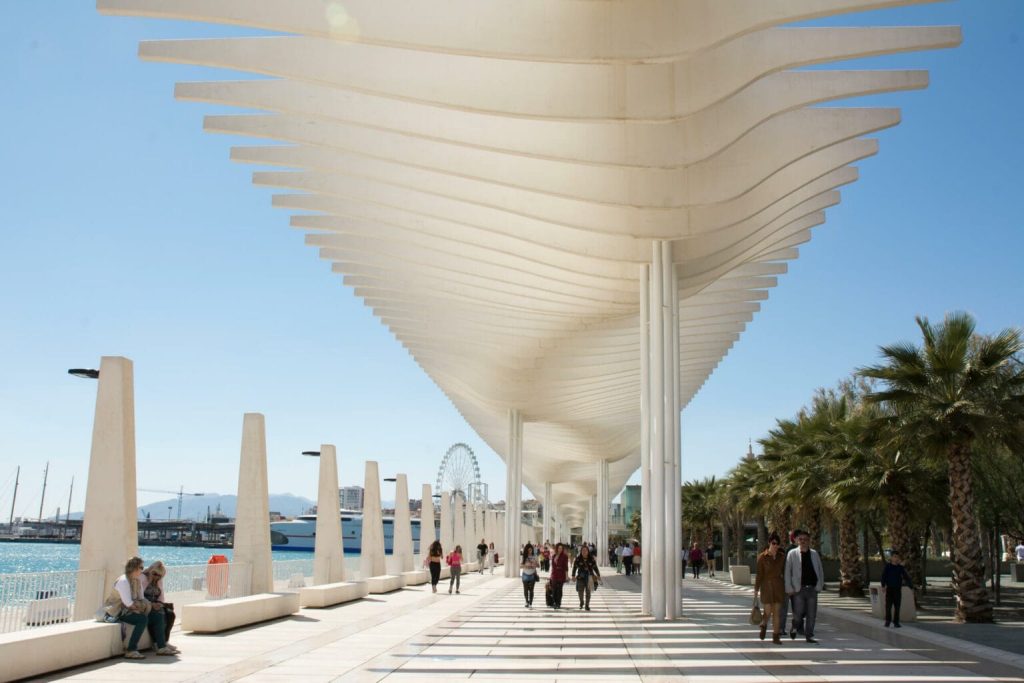
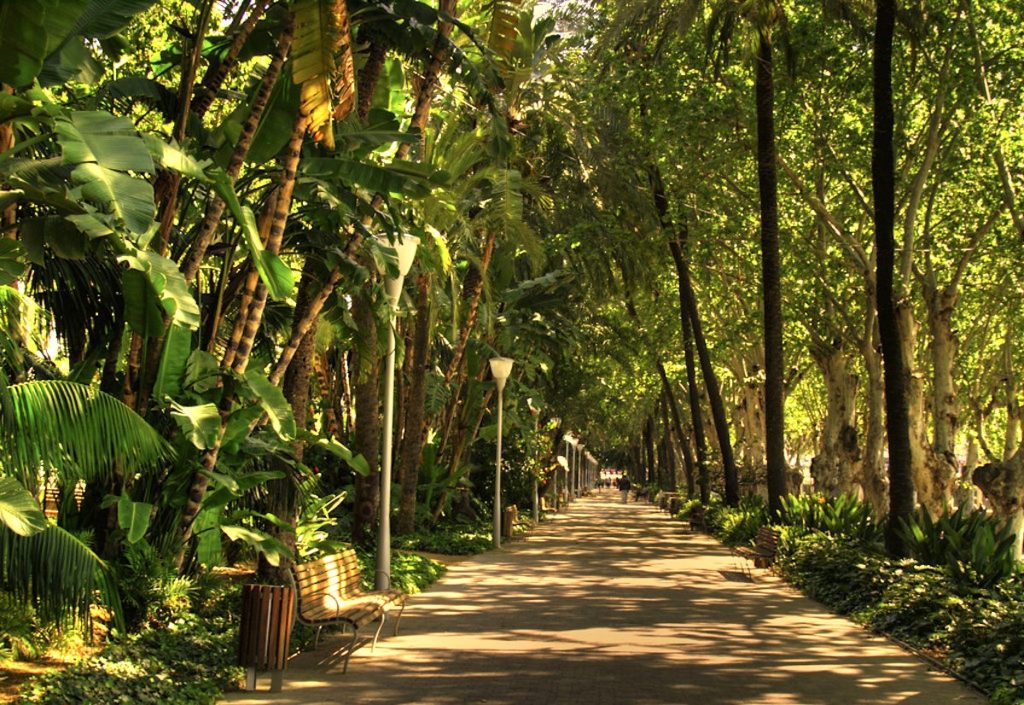
In the park our plans were interrupted by a flip flop malfunction, with Lisa having to limp along on only one. We took sanctuary in a pavement cafe where we had lunch and asked our waiter if he knew of a nearby shoe shop. He pointed one out and, as he did, another man seated beside us offered some tape for a temporary repair.
We stuck around at the cafe for a while, sharing tales of the kindness of strangers, both having travelled a fair bit, and agreeing that most people are kind.
We then set off on a city tour of shoe shops and learnt the Spanish for ‘they come in March’ (ellos vienen marzo), which sandals do in Spain. Eventually, Lisa settling on another pair of flip flops, we set off again for the Pompidou centre, which was closed.
Things weren’t going to plan but we were close to the Castillo de Gibralfaro, pictured below in 2018 when Pip and I made it to the top. We didn’t but we will another day. It was built in the 14th century and sits on a hill commanding a wonderful view of the city, as in the picture at the top of this page.
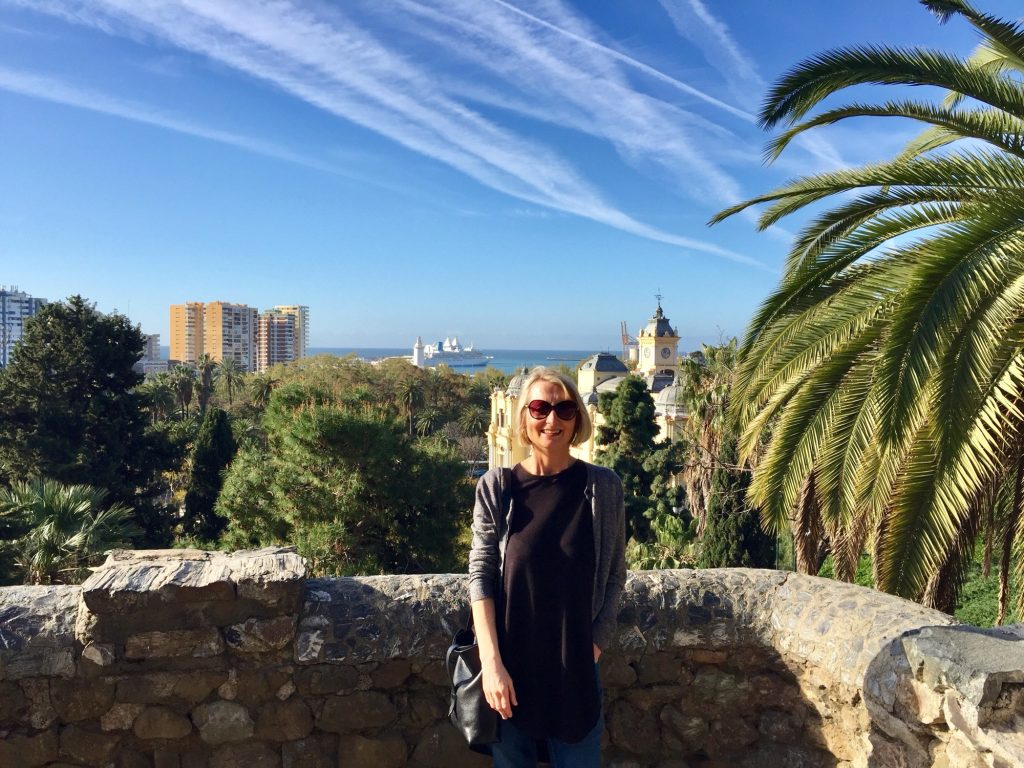
It’s a steep climb to the top but has an array of zig zag pathways through beautiful gardens that make the ascent easier.
We were only on the second or third zig zag when I felt the splatter of fluid on my shoulders, thinking immediately of seagulls, confirmed by an “Oh no – it’s all over you” from Lisa. A smiling man behind, arms and eyebrows raised in sympathy, was pointing to the sky saying ‘bird’, and then to a source of water. He offered tissues.
Water was what we needed so we went to where he’d pointed. The kind stranger, laughing as we were at the situation (what else can you do?), began to wipe at the brown stuff spattered all down my trousers. And it suddenly clicked.
It was masterfully executed as he rubbed vigorously at my thigh with one hand. The other moved to a similar and matching rhythm, his fingers nudging my wallet upwards from the depths of the front pocket of my jeans. He was making slow but well camouflaged progress.
The kindness of strangers turned suddenly sour and I slipped it out of his reach, mouthing to Lisa to hold on to her bag and that we were being robbed. “Thank you my friend” I said, patting the thief on his shoulder with a smile “We’re ok now.”
Knowing that his game was up he walked off, although we saw him later down on the road and he’d waved and smiled as if we were old friends, until I started taking pictures, at which point he ran. I don’t think he’d thought that we’d cottoned on to his ruse until that moment, having walked away thinking only that the circumstances hadn’t been quite right. We’d slipped the hook.
But it screwed up our day and soon after we went home. On balance we still believed that you can count on the kindness of strangers, although not from the chap in the hat below, almost too small and grainy to see.
His is an age old piece of trickery deployed in various forms by thieves all over the world. I met a man last year in Barcelona who’d had the very same thing done to him. He’d walked away thinking only of the kindness of the stranger who’d come to his aid, tapping his pocket just in case and feeling the reassuring bulge of his wallet. Later he discovered that it wasn’t his own, presumably belonging to a previous victim and packed with cardboard rather than cards and money, a use to which his own would no doubt soon be put.
Even with the satisfaction of having realised what was going on and of emerging unscathed, the thief’s intent and a sense of violation lingered.
Some might think such a situation requires a degree of dispassionate objectivity. Some perspective. It does but there was nothing of Robin Hood in our thief’s endeavour. You can’t make your day better by ruining someone else’s, even when no blood’s been spilled or treasure lost.
Shakespeare was surely right that hunger can make a thief of any man but this pot bellied little fucker’s malevolent deceit was borne of avarice and feckless greed.
You could see it in his eyes and smile. He had agency and skills but had taken a path most avoid. Instead he’d chosen artifice, mixing up fake seagull shit before leaving for work. He’d opted for predation, a hunter of the innocent, wallet-bearing, migratory prey who flock to the pool in the summer months.
Here and in much of Spain there’s an economy now dependant and buoyed up by a mutually beneficial exchange. It’s not flawless by any means and has many critics but it works for a good few, the rich pickings of sun and culture seekers considered fair game. Many milk it, most with fair intent, an assortment of municipal initiatives, cultural centres, galleries, archeological sites, various entrepreneurs, workers, performers and even the beggars who simply ask, to whom we give or walk away.
The exchange between the tissue wielding pickpocket and his prey involves a performance, although unsolicited, and a price is paid. But even when no treasure’s lost (none in our case), the price is way too high.
